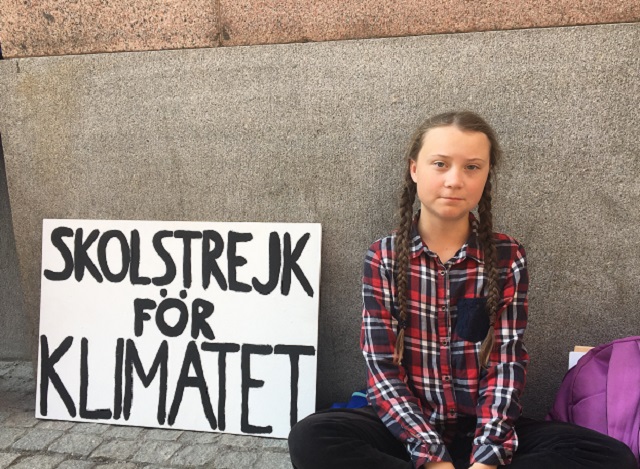Swedish environmental activist Greta Thunberg has been nominated for a Nobel Peace Prize in recognition of her work leading a youth campaign to combat climate change. Three Norwegian lawmakers put forth the 16-year-old’s name.
Activism from a young age
As parliamentary representative Freddy Andre Oevstegaard told Norwegian media outlet VG said:“We have nominated Greta because the climate threat may be one of the most important causes of war and conflict,”. They also add, that the massive movement that Greta has put into motion plays an extremely important role in creating a peaceful environment.
Greta has already been named one of TIME Magazine’s Most influential Teens in 2018
The activist, who was named one of TIME’s Most Influential Teens of 2018, has inspired hundreds of thousands of students at schools around the world to hold strikes in an effort to urge their leaders to act.
She states that she thinks that change is possible and that she’s confident that people will stand up for the good of their future.
Thunberg actually stopped going to school every Friday and chose instead protested in front of the Swedish Parliament to demand more effective measures against climate change.
After her speeches at the UN climate change conference in Poland and at the Davos forum, she became an example for many young people all over the world, who since have promoted similar initiatives.
Climate change is becoming more and more dangerous, and teens more aware
Climate change is a serious matter that should concern us all, considering that according to a U.N. report, global temperatures could rise by 1.5°C, a threshold that scientists say will bring dire consequences to the planet, by as early as 2030 if greenhouse gas emissions continue at the current rate.
In December 2018, Thunberg spoke at the U.N. Climate Change Conference in Poland, where she criticised the government and lawmakers they’re not taking any positive stands. Also, at a World Economic Forum meeting in Davos, Switzerland, in January, she ended her speech with an astoundingly powerful message that she wants leaders to “behave like our house is on fire, because it is.”
As part of the #FridaysForFuture movement headed by the activist, tens of thousands of young people around the world will be skipping school this Friday to march for change.
Six months after Greta Thunberg, then 15, started her “school strike for climate” outside Sweden’s parliament, her protest has gone global.
Thunberg went on strike from school last year in order to protest climate policy, and after her protest gained attention around the world she has gone on to give talks and write articles for international titles.
So far, the weekly walk-outs have seen tens of thousands of mostly high school students take it to the streets in Germany, Belgium, Britain and France, with smaller local actions in several other countries.
But on March 15th, classrooms are set to empty in cities across the globe, from Boston to Bogota, Montreal to Melbourne, Dhaka to Durban, Lagos to London. In Sweden alone, climate protests are planned for 114 towns and cities across the country.
Some local and national leaders have tried to persuade or even threaten students, but such efforts have mostly backfired.
In Australia, when New South Wales Education Minister Rob Stokes said those ditching classes would be punished, Greta – as she is known to all – responded in a tweet: “We hear you, and we don’t care. Your statement belongs in a museum.”
“Dear adults, use your power!” had become an unofficial slogan for the #FridaysForFuture movement.
The wake up call we need about the dangers of climate change
Despite 30 years of warnings about dire impacts, carbon dioxide (CO2) emissions hit record levels in 2017 and again last year. Loading the atmosphere with greenhouse gases at current rates, scientists agree, will eventually lead to a planet that’s going to be way too hot for us to live on it.
The 2015 Paris climate treaty calls for capping global warming at “well below” two degrees Celsius (3.6 degrees Fahrenheit) The planet is currently on track to heat up by at least 4C and that should represent a wake up call for us all, given that it can impact us under every aspect, from global economy to consumer habits.










